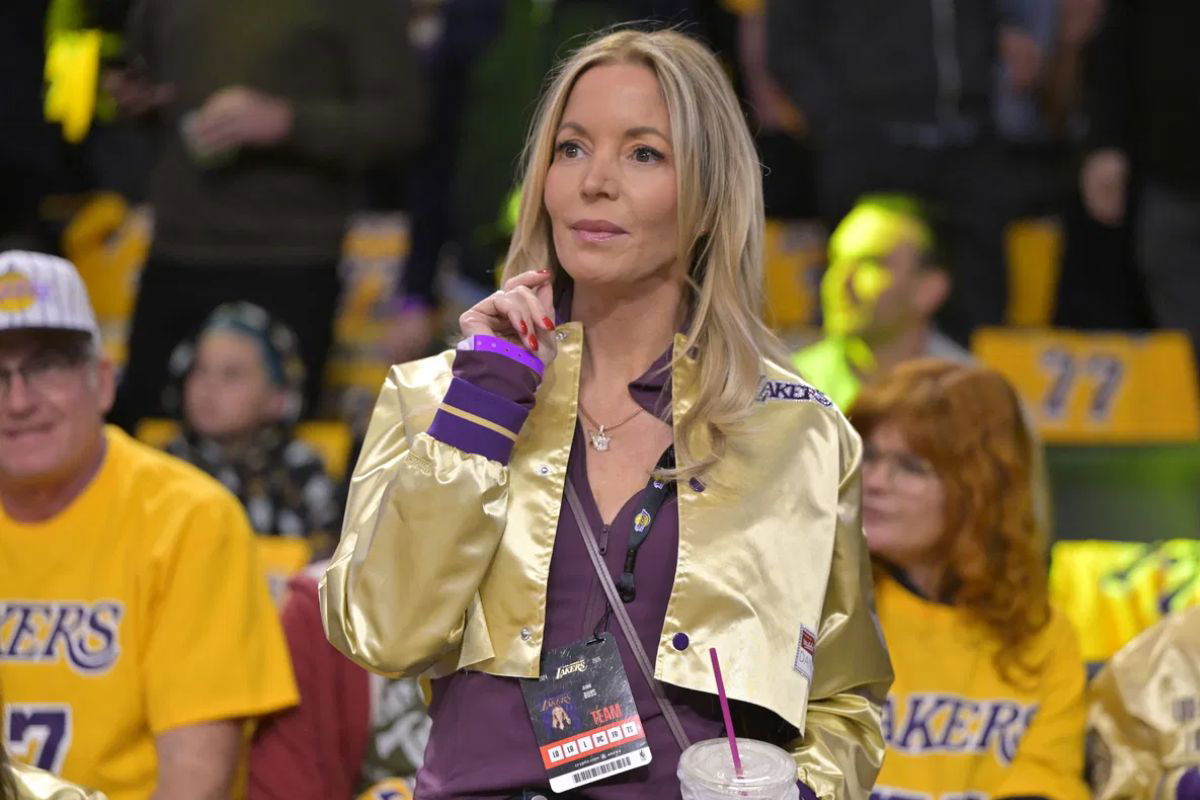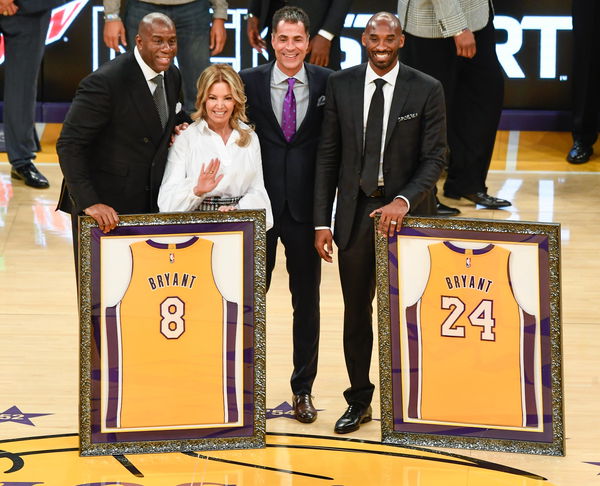
Imago
Feb 10, 2025; Los Angeles, California, USA; Owner and president of the Los Angeles Lakers Jeanie Buss attends the game against the Utah Jazz at Crypto.com Arena. Mandatory Credit: Jayne Kamin-Oncea-Imagn Images

Imago
Feb 10, 2025; Los Angeles, California, USA; Owner and president of the Los Angeles Lakers Jeanie Buss attends the game against the Utah Jazz at Crypto.com Arena. Mandatory Credit: Jayne Kamin-Oncea-Imagn Images

Imago
Feb 10, 2025; Los Angeles, California, USA; Owner and president of the Los Angeles Lakers Jeanie Buss attends the game against the Utah Jazz at Crypto.com Arena. Mandatory Credit: Jayne Kamin-Oncea-Imagn Images

Imago
Feb 10, 2025; Los Angeles, California, USA; Owner and president of the Los Angeles Lakers Jeanie Buss attends the game against the Utah Jazz at Crypto.com Arena. Mandatory Credit: Jayne Kamin-Oncea-Imagn Images
Of all the people you’d expect to be singing Jeanie Buss’s praises, Isiah Thomas, the guy synonymous with the legendary “Bad Boy” Pistons and the guy who spent years battling the “Showtime” Lakers, probably wouldn’t be at the top of your list. But on NBA TV’s pre-game show, right in the middle of the NBA Finals, the Hall of Famer did just that. And in the process, he revealed a secret habit of Jeanie’s, a quiet practice she started years ago, that he believes is the real reason the Buss family was just able to pull off the biggest team sale in sports history.
Watch What’s Trending Now!
Let’s be real, the news that the Buss family sold their majority stake in the Los Angeles Lakers for a mind-blowing $10 billion sent absolute shockwaves through the NBA. And while the number is staggering, the story behind why the sale had to happen is even more fascinating. For years, analysts have described the Lakers as being “house poor.” As ESPN’s Tim Bontemps put it, “It means you own something but you don’t have a lot of actual cash.”
And according to Isiah Thomas, Jeanie’s ability to pull this off was no accident. It was the result of years of quiet, dedicated preparation that he witnessed firsthand. On the pre-game show, Isiah, who has a long history with Jeanie as a peer in the league’s highest circles, shared this incredible insight:
“They say experience is the best teacher and I… I sat next to Jeanie Buss many of times in the owner meetings and watching her sit next to her father, watching her take notes, watching her understand the NBA, the ownership, like, sale,” Isiah revealed.
Zeke made it clear that this wasn’t just some lucky break for her. “I’m not surprised that she’s the one who has negotiated and had the biggest sale of the LA Lakers, taking them from millions to billions,” he continued. “And you know, don’t underestimate the knowledge and experience that she brought to the table cause again, I sat in those owners meetings watching her sit next to her father and take notes. So this ain’t no overnight sensation. She’s the real deal.”
“This ain’t no overnight sensation, she’s the real deal.” 💯
Zeke knows the @Lakers are in a great spot with Jeanie Buss at the helm 🙌 pic.twitter.com/YJEa0yZsRw
— NBA TV (@NBATV) June 20, 2025
That behind-the-scenes education became essential as she faced a two-front war: a brewing family crisis, and an impending financial reckoning. The internal family tension dates back years. In 2017, Jeanie fought off a bitter power struggle with her brothers, Jim and Johnny—a feud that nearly cost her control of the franchise. She won that battle, but another issue lingered. Dr. Buss’s trust was reportedly structured as a “last man standing” inheritance. In short, the last surviving sibling would eventually inherit everything. That meant older siblings couldn’t pass on their shares to their children—making a sale the only viable way to ensure long-term security for the entire family.
A major pillar of that stability was the Spectrum TV deal, generating around $150 million annually—far outpacing most other NBA teams. For comparison, the next-best deal, held by the Houston Rockets, totaled $1.37 billion over 20 years. This revenue stream was especially vital for the Buss family, whose wealth was largely tied to the team, unlike many NBA owners with broader financial empires.
Despite this financial windfall, the Lakers often operated with caution. They declined to renew assistant GM Ronnie Lester’s contract in 2011, skimped on analytics investment, and avoided luxury tax penalties—most notably by lowballing Alex Caruso in 2021. The Spectrum deal’s reliable income allowed the team to stay competitive without the Buss family needing to tap personal funds or take on major debt, even as they trimmed costs elsewhere.
But the clock was ticking in other ways too. As ESPN’s Brian Windhorst recently explained, the Lakers’ entire operating model hinged on a massive local TV deal with Spectrum. That deal had been the family’s financial lifeline. But the collapse of regional sports networks across the country was rapidly turning that asset into a risk. “At some point, even for the Lakers, paying an exorbitant number for local games—that’s gonna run out,” Windhorst said. “When it does, the Lakers won’t be able to keep up.” But now that the deal is done, the question becomes: what kind of owner did Jeanie Buss just hand the keys to?
Why Jeanie Buss’ $10B gamble secured the lakers’ future
For all the headlines about Jeanie Buss stepping away, the real story isn’t just that she sold the Lakers—it’s who she sold them to. Mark Walter’s $10 billion acquisition of the Lakers—after already owning a 27% stake—was a calculated move to secure financial stability at a time when franchise valuations were soaring. The deal delivered roughly $1 billion pre-tax to each Buss sibling, ensuring their long-term financial independence.
Because here’s the thing: NBA ownership is changing. Increasingly, teams are being treated less like basketball institutions and more like high-yield assets. The Mavericks? Sold to a casino billionaire with a real estate-first agenda. The Celtics? Led by venture capitalists who’ve made cold, calculated roster decisions to protect profit margins. Basketball isn’t always the priority anymore.
That’s what makes Jeanie’s decision so brilliant. She sold to Mark Walter—a sports builder, not a brand flipper. As the owner of the Dodgers, Walter turned them into a machine: 12 straight playoff runs, two World Series titles, and a reputation for investing in elite infrastructure—from analytics to development to blockbuster stars like Shohei Ohtani. He co-owns the Sparks. He helped buy Chelsea FC. And everywhere he goes, the same results follow: he builds winners.
Magic Johnson, his longtime partner and Lakers icon, summed it up: “The Lakers are in great hands. He’s a winner.” Walter isn’t here for a real estate deal. He’s here to hang banners. And Jeanie didn’t just cash out. She’s staying on as governor, ensuring the Buss legacy remains—while bringing in the resources and operational muscle the team needs to compete. Because let’s be real: the Lakers’ old model was stretched thin. Six family stakeholders. A top-heavy payroll. Limited flexibility. They needed scale.

USA Today via Reuters
Dec 18, 2017; Los Angeles, CA, USA; Lakers team executives Earvin “Magic” Johnson, Jeannie Buss and Rob Pelinka pose with Kobe Bryant during a halftime ceremony retiring Bryant’s uniform numbers at Staples Center. Mandatory Credit: Robert Hanashiro-USA TODAY Sports
Now, the Lakers enter a new era. Walter isn’t just bringing money—he’s bringing a philosophy of structure and scale. As the Locked on Lakers podcast noted, the days of a three-person front office are done. Expect a bigger staff, deeper analytics, stronger development, and modernized infrastructure. And if GM Rob Pelinka can’t evolve within that new structure? He might not last.
For players like Luka Dončić, this is a game-changer. He’s not just getting star teammates—he’s getting an ecosystem built to help him win, every year. Jeanie Buss didn’t just sell a team. She future-proofed it. She chose legacy and longevity. And in today’s NBA, that may be the boldest move of all.

